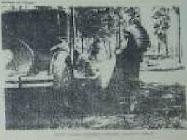Digging around for more background on the Chicago critics, came upon this excerpt from Richard Ohmann (1976).
I can't pretend to be much of a lit historian, but this essay seems to appear toward the beginning of another generation of radical critique, based on a Marxist interpretation of culture. Ohmann seems even-handed & careful about New Critics, interesting overview here of the mid-century theories about nature & purpose of poetry.
Have trouble accepting the underlying premise, however, which seems to be: that social injustices are systemic in nature; that we understand what that system does; that the intellectual classes, the bourgeoisie in general, create their own self-protective ideologies which blind them to reality, etc. etc. [Here we note the parochial bias against business, entrepreneurialism, individual & family enterprise - all those economic activities which structure much of past & present world social economy.]
I don't deny the pervasive & insidious presence of injustice & evil. Nor the forces of conformity & exploitation which structure & process the social reality we inhabit. But I question whether the appropriate interpretation of this reality is a purely econo-political one. That is I think of injustice and inequality - & the seemingly entrenched patterns of oppression which they assume - as symptoms, rather than causes.
Taken as causes, the logic leads to the denunciation of bourgeois property rights, capitalism, the rule of law, democratic institutions, private enterprise, and so on; it leads to the moral disenfranchisement of independent cultural activity (academia, art, literature) - its chastisement for complicity in the "system" (cf. Ohmann's analysis).
If taken as symptoms, the entrenched injustices and inequalities of various nations & societies may have very different systemic shapes & developments; there may be no simple "answer" (Marxist, socialist, nationalist, ethnic, religious, etc.) which provides utopian solutions to the underlying causes : ie. the greed, selfishness, bigotry, aggression, malice, hatred, cowardice, fraudulence, intellectual/moral blindness of human beings, persons, individuals.
Understood this way, we might recognize the ethical value which sometimes accompanies (& enhances) those independent (semi-guilty) aesthetic pleasures & enjoyments (of various degrees of intellectual insight & innocence) which we give & take - in the midst of social corruption, injustice & cruelty. It's a value contained in the moral representation of realities for which we have no simple, abstract, systemic solution, no bureaucratic assignment of moral duties. This is a value in addition to the natural & inherent values offered by beauty in general.
10.05.2005
Labels:
Chicago School2,
ethics,
ideology,
Ohmann,
politics3,
social role3
Subscribe to:
Post Comments (Atom)



No comments:
Post a Comment